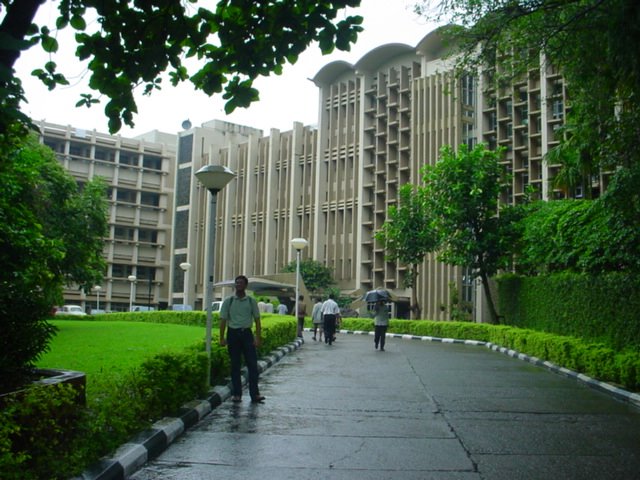


IIT Bombay Campus. Picture Courtesy:http://www.eduvidya.com
Society for Innovation and Entrepreneurship (SINE)
The Society for Innovation and Entrepreneurship (SINE) is a platform for development of entrepreneurship. The SINE supports technology based entrepreneurship and extends the role of IIT Bombay by facilitating the conversion of research activity into entrepreneurial ventures. The IIT Bombay is one of the best institutes of technological innovation and research in India.
An IT business incubator was set up at Kanwal Rekhi School of Information and Technology, IIT Bombay in 1999. The presence of incubator makes the environment at the institute conducive for development of entrepreneurial skills. The initial experiment was a success and hence IIT Bombay is in the process of developing full fledged technology business incubator to cover other areas of science and technology.
The SINE came into being in 2004 to look after the business incubator and thrust the growth of entrepreneurship in IIT Bombay. Since then the SINE is serving as a role model for other business incubators. The incubator are large enough to accommodate 15 – 17 companies.
E Cell
The Entrepreneurship Cell (E-Cell) is a student-led organization that stimulates and supports entrepreneurial thought and performance across the IIT Bombay campus.
The entrepreneurship cell of IIT Bombay believes in the fact that the economy of India need to be driven by young entrepreneurs and hence targets at enhancing the entrepreneurial skills in youth. The E-Cell as it is popularly called, not only motivates the youth to start-up their own enterprise, but also makes efforts to provide them with the necessary resources to do so. For more details Click Here.
MDP Course on Resource Mobilization for NGOs
The opportunities in the voluntary sector have growing leaps and bounds but at the same time there is increasing crisis of resources. The reason for paucity of resources can be attributed to lack of professional approach in resource mobilization. And this lack professional approach to mobilise resources acts as a barrier in sustaining voluntary programmes undertaken by various agencies. If the dedicated volunteer can tackle the crisis if he is an expert at operational techniques for mobilising resources and strategy making.
The Course on Resource Mobilization helps in enhancing management capabilities of the individuals in the non profit undertakings.
Course Details
The 15 weeks certificate course to be conducted in the evening schedule on one of the weekdays and Saturdays by Shailesh J. Mehta School of Management (SJMSOM), Indian Institute of Technology Bombay (IITB) for Society for Services to Voluntary Agencies (SOSVA).
SJMSOM is a reputed management school of IITB and has been consistently ranked among the top ten business schools in India. SOSVA is a capacity building organisation working to strengthen the Non-Governmental Organisations (NGO). It will identify the participants for the programme.
Course Features
Professionally Designed course for the Voluntary Sector, for the first time is offered by SJMSOM. Well-known personalities from the social development sector, besides people from National & International agencies are faculty of the programme.
Course Modules
- The course comprises the following modules:
- Overview of Voluntary Sector in India
- Current pattern of Fund Raising by Voluntary Sector
- Managing of Fund Raising operations
- Developing Communication, Presentation and Critical Skills
- Principles and Practices of Marketing in relation to Fund Raising
- Professional Fund Raising Skills
- Application of Information Technology for Resource Mobilisation
- Principles and practices of management in voluntary organizations
Students will be provided with course material. The course is designed to be completed in a 15 weeks time. The contact sessions will be held as per the schedule.
The School of Management provides Certificate of participation.
Continuing Education Programme
Presently the technological changes are taking place at a rapid pace and sudden boom and burst are frequent in nature, up-gradation of knowledge seems only remedy for survival and this is much needed for those at the helm of affairs. For such people who can not go back for full time education the continuing education offers the wayout. For details regarding the course and admission structure, click here. The institute offers following programmes-
OPEN Programmes (Short & Long Term) – The duration of this programme is 2 – 5 days. Courses on topics of interest to the industry and research are conducted, inviting participation from industries and other organisations.
INHOUSE Programmes (Short & Long Term) – These courses are conducted by IIT Bombay for specific industry and organization on request.
Certificate Courses (Long Term) – Intensive courses on selected topics viz. Information Technology, Computer Aided Design etc. are run, leading to a certificate on successful completion and evaluation.
PG Level Programme (for Working Professionals)
As the name suggests these courses are for working people who want to add up to the technology degree of IIT Bombay to their cap..
SALIENT FEATURES OF THE PROGRAMME:
- The regular courses scheduled for M.Tech. programme of different Departments/Centres relevant for working professionals too are conducted mostly during evening hours, so that the working professionals along with the regular M.Tech. students can also participate in such courses.
- There is no difference in the evaluation, examination and grading, between the regular student and the working professionals
- The participants are provided a “Course Completion Certificate”, along with the grades obtained by them, on successful completion of such courses.
- The institute awards Post Graduate Diploma (PGDIIT) as well as M.Tech. Degree of IIT to those who complete prescribed credit and courses within prescribed period.
- Candidates not interested in the degree/diploma/certificate can also avail the benefits of the evening course to enrich their professional background.
- Courses may not be out under the opening of PGDIIT programme is subject to adequate number of participants.
Post Graduate Diploma of Indian Institute of Technology (PGDIIT)
A Minimum of 58 credits would be required for the award of PGDIIT within a contiguous period of 3 years. The programme must include a seminar (4 credits) or a mini-project (10 credits) as part of the credit requirements.
The minimum passing grade in each course is `DD’ while the minimum cumulative grade point average should be 5.5 for the award of postgraduate diploma.
M.Tech:
- The candidate should satisfy the admission requirements applicable to M.Tech. programme under sponsored category. The candidate should apply for admission as per the prevailing Institute norms at the time of admission of regular candidates.
- Candidates selected for admission will be eligible for the M.Tech. programme through the CEP mode.
- The credit requirements for the M.Tech. programme are as per the prevailing Institute Norms.
- The place of work and duration for the project may be between 1 to 2 years and will recommend the DPGC/ IDPC/ PGC >
- The project should be presented in stages at par with part-time M.Tech. students.
- Candidates within one year of registration of the first course should apply to the concerned DPGC/ IDPC/ PGC through CEP for admission to M.Tech. programme. The minimum CPI should be 6.5 at the time of application.
- The courses to be pursued by the candidate and the time limit for completion of the programme will be recommend by the DPGC/ IDPC/ PGC
Instructions
After deciding on the course(s) of interest, the candidate can meet the concerned course instructor(s) to get details of the course contents, methods of instruction/evaluation/grading etc., as well as regarding the background required to get the benefit of these courses.
Before registration, candidates have to obtain the consent of the concerned course instructor(s) in the column provided for it, in the application form.
The courses are of one-semester duration starting from 27th July, 2004 and extending till last week of November 2004. Each course is generally of 3 hours per week of contact hours. Classes will be conducted at Powai Campus as per the time-table to be finalized during evening hours between 5.00 pm – 8.00 pm. No accommodation will be provided in the campus for candidates registered for such Part-time courses. These courses are non-residential in nature and the candidates have to make their own arrangements for their stay and travel to attend the classes. However, library and concerned laboratory facilities will be open for the use of the candidates during all working hours.
Any other details regarding this programme can be obtained from CEP office:
Candidates can collect application form, details regarding course contents etc., from CEP office, IInd floor, Main Building of the IIT.
Distance Engineering Education Programmes (C-DEEP)
The Distance Engineering Education Programme of IIT Bombay is open to all the eligible people across the length and breadth of the country. The programme is offered through video broadcast, supported by handbook. The broadcast is through satellite transmission to a large number of registered Remote Centres (RCs). Each RC projects the lectures on the screen, in a classroom for upto fifty participants guided by a local supervisor. Participants have the opportunity to ask questions during the lecture, which can be immediately answered by the distant instructor, as in a real classroom. For more details on this programme, Click Here.
Quality Improvement Programme (QIP)
The Government of India has started Quality Improvement Programme in 1970. The IITB is one of the Centers for Quality Improvement Programme (QIP) along with other IITs, IISc and many other institutions. The programme is administered by AICTE.
At present there are three main activities
(i) Providing opportunities for faculty members of AICTE-recognized degree-level engineering institutions to improve their qualifications, by offering admissions to Master’s and Ph.D. programmes .
(ii) Organising Short Term Courses at the QIP Centers for serving the teachers.
(iii) Curriculum Development Cell activities which help to improve classroom teaching.
Admission to QIP involves the following:
a. Scrutiny of all applications in the office of the Principal QIP Coordinator.
b. Short-listing by individual institutions for interviews and dispatch of call letters to those selected for interviews.
c. Recommendations by the institutions.
d. Final selection by the National QIP Coordination Committee (NQCC) and
e. Offer of Admission by the Institution where the final selection has been recommended by NQCC.
For more details on QIP at IITB, Click Here.
Early Faculty Induction Programme (EFIP)
To promote and encourage bright young Engineering & Technology students pursuing PG programmes (M.Tech./M.E./M.S. (by research) or Ph.D.) in identified host institutions to take up teaching career in Engineering Colleges.
In this scheme, candidates will be selected from the host Institutions
- Each EFIP candidate is eligible for a contingency grant of Rs.10,000/- per year of the PG programme after selection.
- The candidates go through two weeks course(s) in the area of pedagogy and teaching skills development during their PG programme.
- The tenure of the EFIP is Post Graduation + Six months after graduation.
- The selected candidates should agree to take up teaching position as Lecturer (AICTE Grade) in the AICTE approved Institutions for a minimum period of 3 years.
- A Placement Brochure giving brief background and the bio-data of the selected EFIP candidates is prepared. AICTE than requests the prospective employers to recruit the EFIP candidates for faculty positions.
- A Tripartite agreement is executed by the EFIP candidate selected as Lecturer to teach for a period of 3 years.
- The candidate after joining the technical institution would be eligible for an amount of Rs.5, 000/- per month by AICTE in addition to his / her salary for a period of 3 years.
- If the candidate does not gets employed, then the candidate is paid a consolidated amount of Rs.10,000/- per month by AICTE for a maximum period of 6 months, while the candidate continues in the parent institute, helping the institution/department in teaching activities.
- If the EFIP candidate does not get any teaching position in any technical institution within this period of 6 months after graduation, then the candidate is freed from the EFIP scheme.
For details, click here.
ELIGIBILITY
Engineering & Technology Students studying in the Institutes listed in the Annexure of AICTE as Host Institution for EFIP with the following qualifications shall be eligible for EFIP:
- All GATE Qualified Engineering & Technology students in the first semester of M.Tech. or equivalent programme (M.E./M.S. (by research))
- B.Tech. Engineering & Technology graduates from IITs pursuing first semester of M.Tech. or equivalent programme (M.E./M.S. (by research)) in IITs & IISc.
- Dual Degree students of 9th semester in IITs.
- Regular Ph.D. students (Engineering & Technology) who have completed 2 years of their programme.
Related Links

Latest
Articles
CBSE Compartment Result 2023 OUT: Click For Direct Link
Home CBSE Compartment Result 2023 OUT: Click For Direct Link The CBSE 10th Compartment Result 2023 is expected to be
IIT Roorkee Launches Professional Certification Program in Product Management
Home IIT Roorkee Launches Professional Certification Program in Product Management The fees five-month long programme is for Rs 1,40,000 +
Join Our Whatsapp Community
Lorem ipsum dolor sit amet, consectetur adipisicing elit, sed do eiusmod tempor incididunt ut labore et dolore magna aliqua. Ut enim ad minim veniam, quis nostrud







